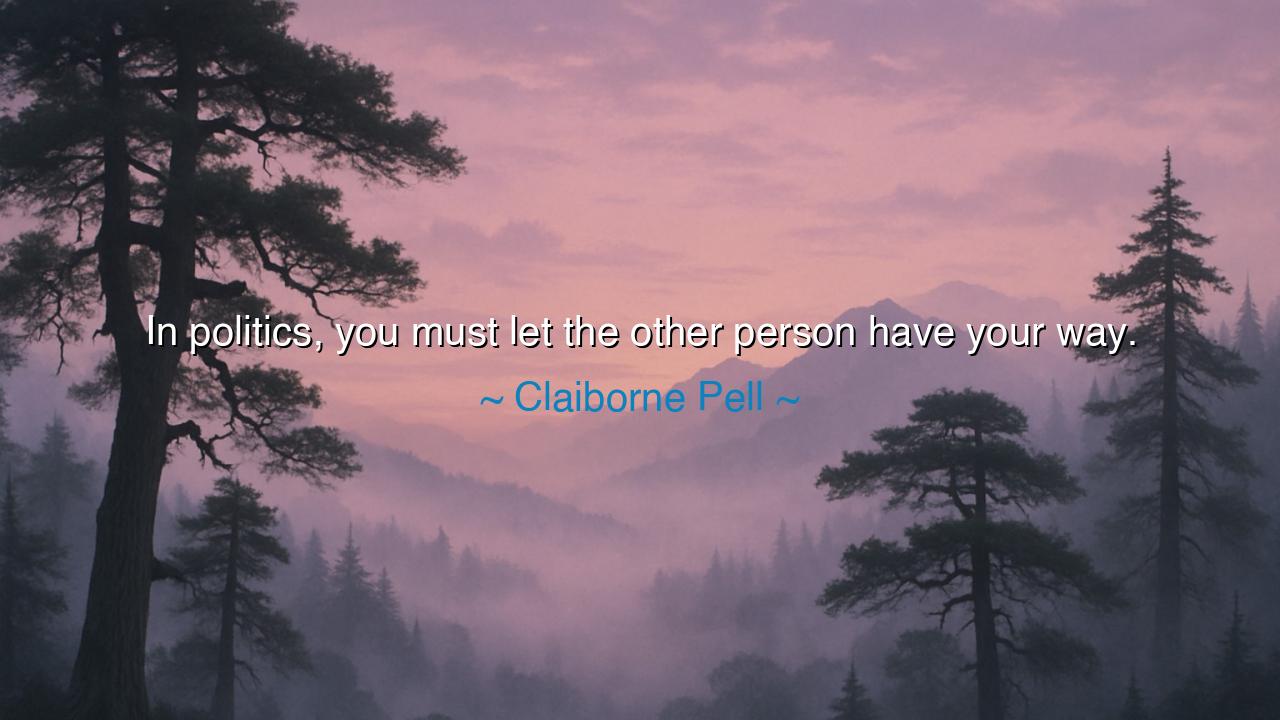
In politics, you must let the other person have your way.






Hear me, O children of wisdom, for the words of Claiborne Pell carry a truth that rings through the chambers of history and the heart of politics: "In politics, you must let the other person have your way." At first glance, these words may seem to run counter to the fierce struggle for power and control that marks much of political life. Yet, in their deep wisdom, they reveal a fundamental principle: true leadership does not always lie in assertion, but in the art of compromise, in the quiet strength to allow others their victory, for in doing so, you win the greater battle. To lead is not to overpower, but to guide, to listen, and to build bridges between those who may never fully agree.
In the world of politics, where factions divide and voices clash, it is the wise who understand that true progress is not the result of a single, dominating will, but of the collaboration of many. Pell’s words speak to the patience and tact required in politics. The greatest victories are not won by the loudest voice or the hardest strike, but by the willingness to give way, to step back at times, and allow others to believe they have prevailed. For in that space of mutual respect and understanding, greater progress can be made, and more significant alliances can be forged.
Consider the example of Abraham Lincoln, whose leadership during the Civil War was marked not only by strength but by his ability to bring together deeply divided factions. Lincoln was known for his remarkable empathy and his willingness to listen to those who opposed him, and he often compromised for the greater good of the nation. It was in his ability to yield, not in moments of weakness, but in moments of wisdom, that he was able to preserve the Union. Lincoln’s strategy was not one of brute force, but of bringing together opposing views, finding common ground where none seemed to exist.
The art of compromise is also evident in the leadership of Nelson Mandela, who, after spending 27 years in prison, did not come out seeking vengeance, but reconciliation. He understood that the path to a unified South Africa was not through punishment, but through allowing his former adversaries to have a place in the new nation. Mandela, with great vision, let others have their way—yet in doing so, he transformed the future of his country. He knew that the greater good often requires a willingness to step aside and allow the other to take the lead at times.
Thus, my children, let Claiborne Pell’s words guide you in your own life and leadership. In the world of politics, and indeed in life, it is not always about winning the fight. Sometimes, true strength lies in the ability to yield, to step back, to allow others their victory, knowing that through such sacrifices, the greater good will be achieved. This is the wisdom of the ancients: that leadership is not the relentless pursuit of one’s own desires, but the quiet guidance of many voices toward a shared and harmonious goal. May you, too, learn the power of letting others have your way, and in that wisdom, find a path to true peace and progress.






AAdministratorAdministrator
Welcome, honored guests. Please leave a comment, we will respond soon